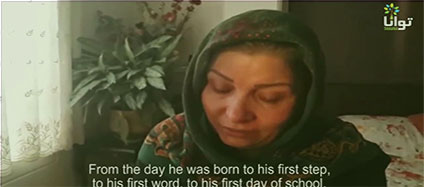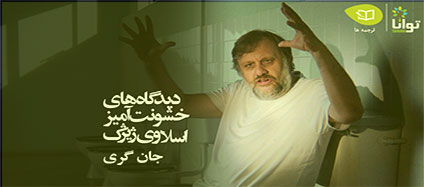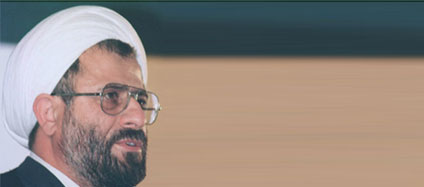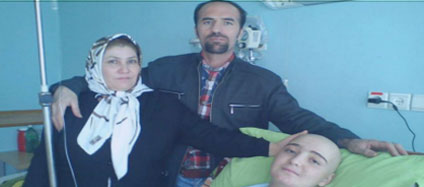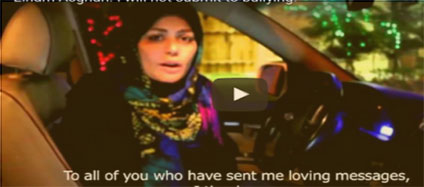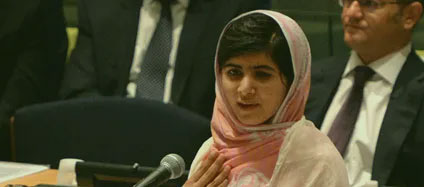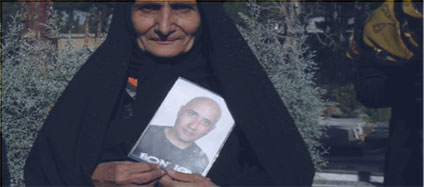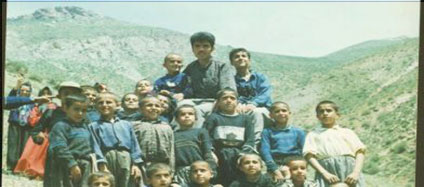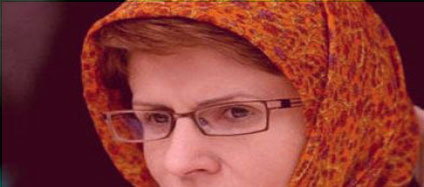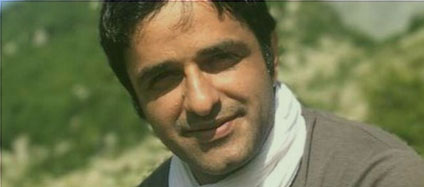Majid Tavakoli stares into the distance, holding a microphone
Majid Tavakoli, a prominent student leader in Iran, was arrested in December 2009. On May 23, 2010, he began a hunger strike in protest of his move to solitary confinement. He wrote this letter from Evin Prison in June 2010.
This paper aims to promote participation and activism in popular movements in the third millennium. This essay is not just for use by Iranian activists, but by every activist who takes part in non-violent campaigns throughout the world. Today’s generation should be fully aware of the precious opportunity it has been offered in present-day Iran, an opportunity so eagerly awaited by people in all parts of the world: a chance for them to actively participate in the making of their own destiny. Living at the same time as history’s major revolutions has always been the deepest desire of many generations, especially freedom lovers. Now that we have this unique opportunity to take our history and destiny into our own hands, we should be grateful… In the dark of this seemingly endless night, it is our hope that there will be a tomorrow… that the world will renew itself, that despotism will vanish, that freedom will arise and we will all share it, in memory of all freedom fighters, all [political] prisoners and, in particular, all the martyrs of the Green Movement.
… What we have learned from hope as the backbone of Iran’s non-violent movement today is that through hope, we will build the foundation of tomorrow’s reality. Reality is supported by hope… That is, change depends on will and action, as that the expression goes, “revolutions depend on the will of revolutionaries”… Now that know we are actually shaping tomorrow’s reality and, with our action, we are building our own history, we must turn our attention to the essential element of knowledge and awareness, so that by combining hope and awareness, our quest can reach its destination. For we shall be victorious!
… Since a progressive campaign, from its leadership to its base, and from its basic demands to its ultimate principles, constantly learns, incorporates and invigorates itself, criticism will guarantee its survival and the survival of its leadership, activists and supporters…Criticism of the movement should be conceived in a positive and forward- looking manner. Two types of criticism should be analyzed and differentiated: “internal criticism” and “external criticism.”
Leaders and known activists who are part of the movement, as its pillars and models, should not deliver general criticism. They should instead concentrate on delivering nothing but hope and expressions of victory at each stage of the movement. In private working sessions and gatherings, however, they should use [practical] criticism of the movement to draw up new plans and policies… Externally, the movement’s supporters should positively criticize it, learning from past mistakes but building on tomorrow and focusing on today’s priorities and necessities in a forward-looking way… Therefore, by clearly identifying these two groups, the internal and the external forces of the movement, we can discover how best to conduct our information, analysis, and communication… For instance, in a group of twenty activists, the ring leader, within his or her network of activists and dissidents, should constantly promote the idea that “we shall be victorious!”
Another important point is that we should pay constant attention to the need to increase the social, cultural, political, and economic assets of the Green Movement… Since any such national campaign is wide-ranging, it is essential for it to attract a wide audience and be inclusive… The Green Movement’s unity is crucial for us to reach our final goal, and it should be constructed with calm so to guarantee its durability. From the start of the movement, it has received the wide support of old opposition forces, both inside and outside the country … As discontent has risen and reforms have faltered, opposition leaders have increased their calls for change.
Thus, the movement’s universality has been made possible by this inclusiveness of both internal and external forces that are dissatisfied with the current situation. This inclusive approach will continue as the Green Movement strives to change the present situation and build a better future. Today, the question of unity within the movement revolves around two points: how to preserve unity within diversity, and how to avoid conflict while maintaining respect for differences. Based on these principles, unity is built not on differences but solely upon common denominators, the most pressing of which is our common fight against despotism.
Values and the discourse of the popular movement shall be filled with hope. It is essential that we keep in mind a few principles for expressing the values of the Iranian people’s revolutionary movement. Essentially, revolutionary values are transmitted by the revolution’s aftermath. It is this principle that has been widely used in bloody, destructive revolutions to justify revolutionary executions. Therefore, insisting upon the non-violent character of the movement, while rejecting violence in the aftermath of radical change – revolution – will become a priority for all, especially for the revolutionaries. Thus, it is necessary to carefully reflect upon the values which direct our efforts to change the current situation.
The universality of our values, encompassing all the essential aspirations stemming from contemporary movements, the respect for others’ values and rights, and the anti- despotic character of our revolutionary movement, has become a founding value. This is complemented by pluralism and tolerance as guarantors of tomorrow’s peaceful socio- political coexistence. Universal values such as liberty, equality, fraternity, and human rights have become the founding stones of tomorrow’s post-religious, secular and democratic political order… One must know that the Green Movement of the people of Iran is a wide-ranging popular one, formed in order to change the status quo in a non-violent campaign known as a velvet or “color” revolution for liberty and democracy, in a continuation of similar movements [elsewhere]. Regardless of what the regime, its propaganda machine and followers say, the velvet revolutionary character of the [Green] movement is a matter of pride for us all…
… The Green Movement is subversive and intends to change the existing situation. It relies upon active popular participation and the strengthening of civil society – i.e. an active, objective, and conscious presence in the social arena. It relies on wide-range awareness raising. It relies on courageous participation in assemblies. It demands perseverance until all our demands are fulfilled. It asks for the revolutionary defiance emanating from its leadership… In the current phase of our anti-despotic movement, we are taking a subversive approach confronting the institutions of the status quo and maintaining a targeted, audience-centered communication…
Although informing and communicating are pre-revolutionary activities paving the way for the revolution, in the revolutionary phase itself, such activities as regular gatherings, study groups and so on are still important… One should have a strategic approach to these matters in general, regardless of the phase of the movement…
Regarding the methodology of our movement, non-violence should remain our overarching principle in combination with violence-deterring methods…
The movement that was born out of the scandalous, massive electoral fraud and its violently repressive aftermath with its plethora of arrests, tortures, rapes, and executions, bears the Green color. The Green movement sought, at the beginning, its stolen “vote” and, in the process described above, became a subversive movement seeking nothing less than regime change and the overthrow of the Supreme Leader. Its initial pro-Mousavi and anti-Ahmadinejad slogans became [synonymous with] anti- Leader and anti-Guardianship of the Theologian slogans… As the gap between the State on one hand and the Nation on the other widened, the people proved their unshakable will to bring radical change to the status quo as embodied by the Islamic Republic as the incarnation of rise to power of Islamic fascists…
While international sanctions may worsen economic hardship in Iran, they will not have such a catastrophic effect on the country’s future. Under the rule of the Islamic Republic, economic hardship has become an entrenched reality. The end of dictatorship in Iran could only bring about a better future… [The regime’s] nuclear weapon and ballistic missile programs have emboldened the international community to impose ever harsher sanctions… Free countries and freedom lovers around the world should both increase their pressure on the regime and support the Iranian people in their anti-despotic revolutionary movement … Iran’s first and foremost problem is human rights, and the world should put this at the top of its agenda while confronting the Iranian regime. The regime will do anything in order to divert international attention from human rights to nuclear issues…
Particular attention should be given to media and communication, as the axis of the management of the movement for change… The Islamic Republic’s media tactics should be denounced.
The alternative political order that will emerge in the aftermath of radical change in Iran, is yet another subject of central importance… Our problem today is not limited to despotic governing individuals but concerns an entire system of governance which can give rise to nothing other than despotism… Therefore, the future should be drawn up carefully and explained. In doing so, such a design cannot be limited to grand principles but should rather include such central issues as the rights of minorities, the rights of our ethnic communities, our future foreign politics, the future of our nuclear industry, and the methodology of governance in the future…

